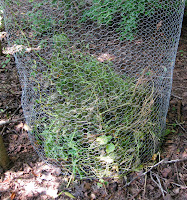As I've noted in previous posts, our first summer garden here at Little Bent Creek Farm has been surprisingly productive overall. We've reaped heaping piles of cucumbers; baskets full of green beans; volcanic eruptions of hot peppers; mountains of lettuce; enough basil for a 2-year supply of pesto; and more tomatoes than I've known what to do with. Of course, some of our plantings failed miserably and others did just fair. I had wondered whether I'd be able to grow celery here, and evidently I'm not (at least not yet). The spinach also flopped (I think I got it in the ground too late.) The corn and okra we got were delicious but the stalks grew way too high and produced much less than we would have liked (probably because of a lack of full sun in the area of the yard where the garden sits). The sugar snap peas did well at first but died off really quickly (damaged by an unknown garden pest), so we only enjoyed those for a couple of weeks. And the cabbage was fairly devastated by slugs.
All-in-all, though, our summer cup ranneth over. Perhaps that is why I found myself a little surprised--and strangely sad--the other day when I walked out to the garden, looked at the cucumber bed (pictured above), and realized, "Oh my, the garden is dying." Why this took me aback I don't know. I've dug, planted, weeded, or harvested nearly every other day this summer--and some weeks, every day. I've witnessed up close the myriad changes the plants and the ground have gone through. But it hadn't fully struck me until that moment that this garden's days were nearing an end.
In some ways, it's almost a relief--no more rushing around to find new canning recipes, or freezing and drying guidelines. No more itchy arms from reaching inside the fronds of zucchini plants. No more wracking my brain to devise a chemical-free way to get the Japanese beetles away from the green beans. Well, at least not for a few weeks.
 |
| Dead vines composting into nourishment for future plants |
 |
| Goats and chickens feasting on spent garden plants |
In central North Carolina, gardeners are fortunate enough to be able grow vegetables, herbs and flowers the whole year round. So within a couple of days of hearing the garden death bell toll, I was busy tearing out plants and adding new compost to the spent beds, prepping them for late-summer and fall plantings. (The goats and the chickens have been loving this chore--gobbling up all the leaves, pods, fruit, and stalks I toss at them.) And already back in several of the beds where last week vines were shriveling are newly seeded beans, several different kinds of lettuce, collards, dill, brussels sprouts and broccoli. I hope to get around to planting a few more cool-weather crops this weekend.
 |
| Bed waiting for new seeds |
The Farmer, Speaking of Monuments
--Wendell Berry
Always, on their generation's breaking wave,
men think to be immortal in the world,
as though to leap from water and stand
in air were simple for a man. But the farmer
knows no work or act of his can keep him
here. He remains in what he serves
by vanishing in it, becoming what he never was.
He will not be immortal in words.
All his sentences serve an art of the commonplace,
to open the body of a woman or a field
to take him in. His words all turn
to leaves, answering the sun with mute
quick reflections. Leaving their seed, his hands
have had a million graves, from which wonders
rose, bearing him no likeness. At summer's
height he is surrounded by green, his
doing, standing for him, awake and orderly.
In autumn, all his monuments fall.

